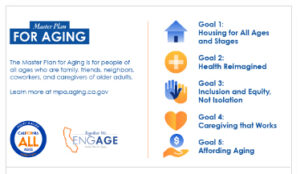California’s Health & Human Services (HHS) Secretary Mark Ghaly and California Department of Aging (CDA) Director Kim McCoy Wade announced yesterday the release of California’s first-ever Master Plan for Aging (MPA). The MPA is designed to provide a comprehensive framework that will prepare the state for significant demographic changes in the years ahead, including the growth of the 60-and-over population to 10.8 million people by 2030.
 The final MPA includes a 10-year blueprint for promoting healthy aging and outlines 5 Bold Goals and 23 Strategies for leaders in government, business, philanthropic, and community-based organizations to collaborate on creating age-friendly communities for all Californians.
The final MPA includes a 10-year blueprint for promoting healthy aging and outlines 5 Bold Goals and 23 Strategies for leaders in government, business, philanthropic, and community-based organizations to collaborate on creating age-friendly communities for all Californians.
The MPA’s Five Bold Goals for 2030:
- Housing for All Ages and Stages. We will live where we choose as we age in communities that are age-, disability-, and dementia-friendly and climate- and disaster-ready. Target: Millions of New Housing Options to Age Well.
- Health Reimagined. We will have access to the services we need to live at home in our communities and to optimize our health and quality of life. Target: Close the Equity Gap in and Increase Life Expectancy.
- Inclusion and Equity, Not Isolation. We will have lifelong opportunities for work, volunteering, engagement, and leadership and will be protected from isolation, discrimination, abuse, neglect, and exploitation. Target: Keep Increasing Life Satisfaction as We Age.
- Caregiving That Works. We will be prepared for and supported through the rewards and challenges of caring for aging loved ones. Target: One Million High-Quality Caregiving Jobs.
- Affording Aging. We will have economic security for as long as we live. Target: Close the Equity Gap in and Increase Elder Economic Sufficiency.
The MPA will be powered by more than 100 action-ready initiatives that have already been adopted by state agencies and are prepared for implementation, in partnership with stakeholders and the Legislature.
Palliative care and advance care planning are specifically addressed in three of the initiatives:
- Initiative 49 = Highlight to Medi-Cal plans and providers the value of palliative care to improve patient outcomes and support patient and family choices for care.
- Initiative 50 = Identify ways to promote care wishes – such as Advance Planning Directives and Physician Orders for Life Sustaining Treatment – for all ages.
- Initiative 74 = Develop approach for patient representatives for residents of skilled nursing facilities without capacity, representatives, or written care wishes.
“This Master Plan on Aging advances bold, innovative, uniquely Californian solutions for issues that we will all confront within our own families and communities, if we have not already—and does so with a sustained focus on equity that we need to lift up everyone,” said Governor Gavin Newsom. “The Plan reflects more than a year of hard work, research and sustained engagement to drive the partnerships that will improve lives for the older Californians of today and tomorrow. I thank everyone who contributed to this tremendous blueprint for the work to come.”
With goals and strategies for leaders in government, business, philanthropy, and community-based organizations to collaborate on creating age-friendly communities for all Californians, the MPA sets a series of ambitious targets that will be used to track progress and provide accountability.
The final plan also includes a Local Playbook to assist state and local government, communities, and private and philanthropic organizations in building environments that promote an age-friendly and disability-friendly California.
“It has been an honor and an incredible experience to represent palliative care as a member of the MPA Stakeholder Advisory Committee,” said CCCC’s CEO Judy Thomas. “We are excited to see palliative care and advance care planning included in the 10-year Master Plan, and we are committed to continuing our work with the Administration, lawmakers, and stakeholders to implement the Master Plan and ensure the needs of individuals with serious illness are accurately represented.“
Learn more about CCCC’s work on the Master Plan for Aging through some of our previous blog posts here and here.